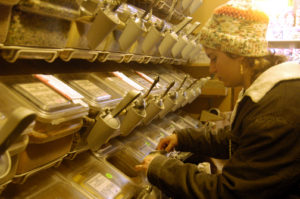Students buying from area stores better benefits community economics, study shows
By Kelsey Binion
<[email protected]>
For senior Kara Cifizzari shopping at local businesses, including the ones in the Carmel Arts and Design District, has been regular part of her routine. She said there are benefits to it.
“Name-brand stores sell their name and people buy their products for the name. With local shops, there is a lot less transportation and less energy used. It’s more independent and individual,” Cifizzari said.In fact, in addition to the benefits Ciffizarri mentioned, shopping at local retailers may also help the local economy, more so than shopping at chain retailers. Economic Impact Analysis, a 2002 study done in Austin, Texas, compared the impact of shopping at local businesses with that at national chains. For every $100 spent at a local bookstore, $45 stayed in the local economy according to the study. However, for every $100 spent at Borders, a national chain, the local economic impact was only $13.
According to the article “The Importance of Buying Local” from expressmilwaukee.com, another study done in 2003 yielded similar results. Shopping locally kept three times more money in the local economy than shopping at chains. Modest changes in consumer spending habits can generate substantial local economic impact.
Also according to the Economic Impact Analysis, locally owned merchants generally have greater impacts on local economies than outlets of national change due to three classes of expenditure. First, spending on local labor typically comprises a greater share of operating costs for a locally-owned  establishment than for a national chain. Also, large national chains purchase fewer goods and service in the markets. Their products, advertising and supplies are usually procured at the national level. However, local stores purchase a substantial portion of goods and services from local firms, keeping that money in the community.
establishment than for a national chain. Also, large national chains purchase fewer goods and service in the markets. Their products, advertising and supplies are usually procured at the national level. However, local stores purchase a substantial portion of goods and services from local firms, keeping that money in the community.
Nate Roberts, a clerk at Good Earth in Broad Ripple, said, “Since we do not have the kind of money that large corporations have, which send out flyers in the newspapers, we have to rely on consumers’ trust and our history.”
In addition, the profits made from a nationally-owned store go directly to the headquarters outside the region. Owners of local stores, on the other hand, are members of the local community and tend to spend their earnings on goods and services locally or supporting local organizations.
Economics teacher Dan Bates said, “Larger stores have much greater revenues. Customer service is better with local stores. Local stores are more likely to support Carmel events than larger stores.”
Cifizzari said, “I feel better about where my money is going. I don’t know where my money is going with Wal-Mart (for example). With local stores, I know where my money is going and how it’s going to make an impact.”
Roberts said, “Independent stores are far more personable. We care more about the individual. Large corporations don’t really draw in the direct contact, but that is what we strive for.”
Cifizzari said the stores make me feel good about investing in certain products. “The main thing is the connection with people,” she said. “It’s more personal; since it’s part of the community, they want to help the people there.”
“I like to support independent businesses because it’s more personal. I know the people who work there (Good Earth), and they care about me as a person and not what’s in my wallet,” Cifizzari said.
However with the struggling economy, local and national business are challenged because fewer people are spending money.
“The smaller merchants have more trouble weathering the recession,” Bates said. “If there’s a 50 percent drop in sales, then their income drops 50 percent as well.”
Cifizzari said residents here should consider shopping locally more often.
Cifizzari said, “If you want a bigger impact in the community and greater awareness of the earth and people, then you should look into local stores.”





















































![Review: “Suits” is a perfect blend of legal drama and humor [MUSE]](https://hilite.org/wp-content/uploads/2024/04/unnamed-1.png)
![Chelsea Meng on her Instagram-run bracelet shop [Biz Buzz]](https://hilite.org/wp-content/uploads/2024/04/IMG_2446-1200x838.jpg)
![Review: Quiet on Set: The Dark Side of Kids TV is the long awaited exposé of pedophilia within the children’s entertainment industry [MUSE]](https://hilite.org/wp-content/uploads/2024/04/unnamed.jpg)
![Review: “The Iron Claw” cannot get enough praise [MUSE]](https://hilite.org/wp-content/uploads/2024/04/unnamed.png)
![Review: “The Bear” sets an unbelievably high bar for future comedy shows [MUSE]](https://hilite.org/wp-content/uploads/2024/03/unnamed.png)
![Review in Print: Maripaz Villar brings a delightfully unique style to the world of WEBTOON [MUSE]](https://hilite.org/wp-content/uploads/2023/12/maripazcover-1200x960.jpg)
![Review: “The Sword of Kaigen” is a masterpiece [MUSE]](https://hilite.org/wp-content/uploads/2023/11/Screenshot-2023-11-26-201051.png)
![Review: Gateron Oil Kings, great linear switches, okay price [MUSE]](https://hilite.org/wp-content/uploads/2023/11/Screenshot-2023-11-26-200553.png)
![Review: “A Haunting in Venice” is a significant improvement from other Agatha Christie adaptations [MUSE]](https://hilite.org/wp-content/uploads/2023/11/e7ee2938a6d422669771bce6d8088521.jpg)
![Review: A Thanksgiving story from elementary school, still just as interesting [MUSE]](https://hilite.org/wp-content/uploads/2023/11/Screenshot-2023-11-26-195514-987x1200.png)
![Review: When I Fly Towards You, cute, uplifting youth drama [MUSE]](https://hilite.org/wp-content/uploads/2023/09/When-I-Fly-Towards-You-Chinese-drama.png)
![Postcards from Muse: Hawaii Travel Diary [MUSE]](https://hilite.org/wp-content/uploads/2023/09/My-project-1-1200x1200.jpg)
![Review: Ladybug & Cat Noir: The Movie, departure from original show [MUSE]](https://hilite.org/wp-content/uploads/2023/09/Ladybug__Cat_Noir_-_The_Movie_poster.jpg)
![Review in Print: Hidden Love is the cute, uplifting drama everyone needs [MUSE]](https://hilite.org/wp-content/uploads/2023/09/hiddenlovecover-e1693597208225-1030x1200.png)
![Review in Print: Heartstopper is the heartwarming queer romance we all need [MUSE]](https://hilite.org/wp-content/uploads/2023/08/museheartstoppercover-1200x654.png)























![Review: Ladybug & Cat Noir: The Movie, departure from original show [MUSE]](https://hilite.org/wp-content/uploads/2023/09/Ladybug__Cat_Noir_-_The_Movie_poster-221x300.jpg)

![Review: Next in Fashion season two survives changes, becomes a valuable pop culture artifact [MUSE]](https://hilite.org/wp-content/uploads/2023/03/Screen-Shot-2023-03-09-at-11.05.05-AM-300x214.png)
![Review: Is The Stormlight Archive worth it? [MUSE]](https://hilite.org/wp-content/uploads/2023/10/unnamed-1-184x300.png)

